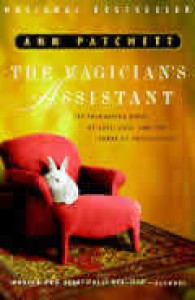sarah
Jane Eyre by Charlotte Brontë
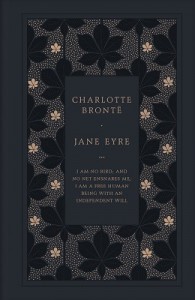
I dodged this book in high school, choosing to study Wuthering Heights instead. I'm glad I did, because I doubt I would have enjoyed it as much as a teenager as I do now.
I loved Jane SO MUCH. She was smart and stubborn and exasperating and absolutely correct. I loved that she knew she was annoying, and that she couldn't help it. She knew her life would have been different if she could just be more mannerly and agreeable, but she couldn't make herself do it. She bristled not just at the idea of being shackled by marriage, but also of being shackled by social niceties. She wasn't a brute, but she could not form a fake smile if her life depended on it, and this was so endearing to me. She was open-minded, but morally strong. She was compassionate, and very aware of her own shortcomings. I could have spent so much more time with her!
It's wild that this book was published in 1847 under a male pseudonym. Did anyone really believe that this novel, which examines the interior life of an unconventional lower-class woman, was written by a man? I have a doubt.
Judy Fong Bates: Midnight at the Dragon Cafe
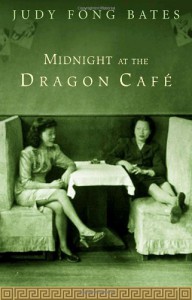
I liked it, but I think it would be hard to love. The novel felt like a memoir, to the point where I found myself wishing that Fong Bates had simply written more directly about her childhood. I found it so hard to connect with Su-Jen/Annie, the main character, who observes the people around her without doing anything, without even reacting. I don't think it was Su-Jen's character to use her voice, but she could have shared how she felt with the reader. I know, the theme of the book is "swallow your bitterness", but it would have been nice to know how Su-Jen felt about what she was suppressing. I guess it's arguable that she was suppressing her feelings from her own self, too. I guess?
Everything else about the book is delightful. My heart ached for Su-Jen's father, who sacrificed everything for his family, who worked so hard even into old age, who knew what his white customers thought about him but didn't let himself be hurt by them. And for her mother, who was just so unhappy, whose life had been changed for the worse by her move to Canada, who could feel happiness within reach but who had to sacrifice that happiness, for her family. And even for her brother, who was just a few years too old to be fully Canadian and free from the old traditions like Su-Jen was. And I loved Charlotte and her quirky family so much.
I would love to read more books about first-generation immigrants. This book was completely worthwhile, and despite my frustration with its main character, I would recommend it.
Lionel Shriver: We Need to Talk About Kevin
Keith Ross Leckie: Coppermine
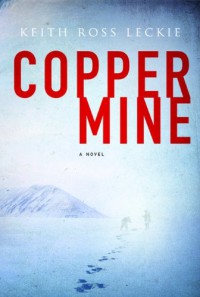
This book checks a lot of my favourite boxes: Canadian history, historical fiction, and Native culture. Oh, and winter. Leckie's writing is quite good for this story. I wished I had understood the characters a little more, and I felt like Leckie maybe let their actions define their characters. I guess I'm saying there were no real surprises here. Nobody changes. Fine, for a plot-driven page-turner, but not satisfying for me. Nevertheless, I do not regret having picked it up, and it got me through some long days at the airport. Recommended.
Tom Perotta: Mrs. Fletcher

I really enjoyed this book. The main character, Eve, is almost exactly the age I was when I read it, and I found much in her character that I could relate to. I liked how the book opened with Eve observing that big days never go the way you hope they will, and then the reader watches as each character had to cope with their big plan not going the way they hoped it would, and how they have to find a new way. I also liked how each character started out as almost a stereotype, and gradually became an individual as they let go of expectations and embraced their own choices. I loved the mistakes they made as they were trying to figure it out. I really liked this book. Recommended.
Douglas F. Warrick: Plow the Bones

The "F" in Douglas F. Warrick tells you a lot about how this book is going to read. It was clearly written by someone who goes by Douglas, not Doug, and who would correct you if your forgot to include their middle initial in their name.
The prose is arch, affected, and in love with itself. It's impossible to separate reading these stories from feeling like Warwick is reading over one's shoulder with you, excited for you to get to his favourite turns of phrase. I knew I wasn't going to finish this book when I came across this particularly precious paragraph in "Funeral Song for a Ventriloquist":
A confession. This story began with a lie. This story wanted very much to end here. And so it spun a fabrication within its very second sentence. But this is not the end of this story, as ashamed as it may be to admit it. This is the rest of this story, told into the void as all stories are. Until their end. Whether they like it or not.
Godawful. I get that this is a young author, and I hope his style improves in his future work. I liked some of the ideas, especially in "Zen and the Art of Gordon Dratch's Damnation" (OMG that title though). I would bet that as he matures, Warrick will gain some confidence and step away from the wrought prose and let his stories stand on their ideas. I hope.
To quote from an Amazon reviewer named August, "The writing is very good. But I personally hated it." Not recommended.
Elizabeth Berg: Dream When You're Feeling Blue
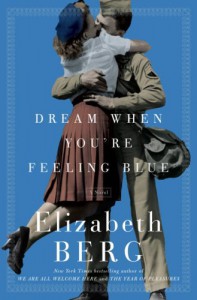
I picked this up because I am a fan of Berg's other books, but I found this novel disappointing. It didn't add anything to my understanding of the war years (I have watched many movies from the 1940s), and without that setting as a novel framing device, the reader must rely on the interior life of the characters for the success of the novel. Unfortunately, the fact that the war is going on was pretty much the only interesting traits the characters had.
Honestly, watch Mrs. Miniver instead. (And The Miracle of Morgan's Creek for Tish's story!)
Anne Tyler: The Amateur Marriage
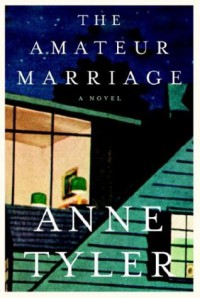
I usually love Anne Tyler's novels, but this one left me lukewarm. Although it is, like her other novels, thoughtful and well written, I didn't get much from it. The characters live, age, die. Huh.
After reading it, I learned that Tyler had intended to keep writing this book for her entire life, weaving new parts of the family into it and extending it back in time. She saw it as a work without an ending. This helps explain the lack of structure. Also, I'm not sure that this kind of work qualifies as a novel? Either way, it was lovely but totally missable.
Peter Rock: My Abandonment
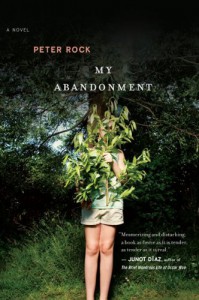
I thoroughly enjoyed this book. I especially liked the tone of the narrator, Caroline. She is straightforward and guileless, which seemed appropriate for someone who has been raised alongside but separate from society, and who has been taught to mistrust everyone who is not her father. I can't imagine how hard it must have been to strike this note, and I was constantly impressed. Recommended.
Helen Mcdonald: H Is of Hawk

I had high expectations for this one, and it was amazing. The contrasts that Macdonald manages to hold in balance! Grief and savagery, science and literature, singlemindedness and insanity, bravery and panic, memory and immediacy, studied technique and desperation, commitment and unravelling. Honestly, this book was breathtaking. Highly recommended.
Barbara Ehrenreich: Living with a Wild God
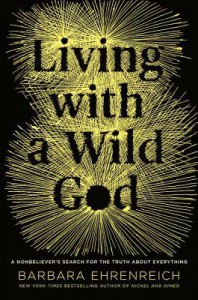
WHOAH what did I just read? Ehrenreich experiences several dissociative episodes as a teenager, and concludes that maybe some of us are visited by non-corporeal beings in our minds who practice interspecies symbiosis"? Wow, I did not see that ending coming.
But that's not even why I disliked this book. For the first 80% of the book, Ehrenreich dryly reconstructs her teenage from the journal she kept as a teenager. Although her experiences are fascinating (especially if you don't know anyone who suffers from solipsism syndrome, which I did not), her writing is disappointingly straightforwardly and descriptive. It's hard to imagine writing dispassionately about a childhood like hers, but Ehrenreich is very closed to exploring her own emotions. In fact, she nonsensically refuses to call this memoir a biography and instead insists on seeing it as a scholarly work about religion.
I feel that this is the same impulse that leads her to conclude that her solipsism syndrome and dissociative episodes are mystic experiences caused by some wilful Other being, and not the result of a combination of brain chemistry and an unhealthy childhood. Tantalizingly, she hints that she is aware of this: she writes, “To acknowledge the existence of other people is also to acknowledge that they are not reliable sources of safety or comfort.” But in the end, she can't embrace this truth, and instead veers off into mysticism. It's a disappointing ending to an insanely frustrating memoir (don't even get me started on the day she realized that people around her were actual human beings who were being drafted into the Vietnam War).
This is my first Ehrenreich book, although I have others waiting on my shelf. I had always thought of her as a pragmatic and practical writer, and I have been looking forward to both Nickled and Dimed and Bright-Sided. I hope she is more honest with other topics than she is with her own mind.
Paula Byrne: Perdita
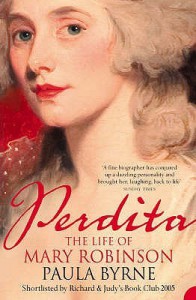
Mary Robinson made some fascinating life choices, which are here outlined in painstakingly accurate detail. Sadly, the reader has to supply all the excitement, sympathy, outrage, and regret, as the author carefully sticks to only the documented facts. I'm confident that this is an excellent work of history, but it is not very readable. I made it as far as Mary's return from France (about 2/3 of the way through the book), but when she started her poetry career I had to put it down. Byrne's dry prose, broken up with excerpts of 18th Century British poetry, was just too tedious. Not recommended.
Stephen Batchelor: Confession of a Buddhist Atheist

I picked this book up expecting it to be lecturey, but I was surprised to find it an engaging and delightful read. I read it quickly, and expect to pick it up again some day.
Batchelor begins his story, which is part memoir and part religious history, at the point in his life where he was most committed to Buddhism and yet starting to have doubts about parts of the Tibetan Buddhism he was practising. He backtracks to describe how he came to Buddhism, and then elaborates on the problem of "belief" he experienced. His first reaction was to explore other branches of Buddhism, but he found himself unable to escape the requirement of some form of faith in all the sects with which he engaged. This led him to seek out the original writings of Siddhattha Gotama [his spelling], and at this point the book pivots to an account of the life of Siddhattha Gotama and the earliest history of Buddhism, as recorded in the Pali Canons.
At this point in the book, I found that Batchelor added life to Gotama's story, and the reader is introduced to him as a human being. Batchelor extracts only the parts of the Pali Canons written by Gotama or (more or less) reliably telling us about his life and the culture he lived in. We learn that many of the beliefs we associate with Buddhism -- most notably the beliefs in reincarnation and karma -- were not actually held or advocated by Gotama. Gotama's Buddhism is less religion and more philosophy, but a very practical one which addresses the problem of human suffering -- and no more.
For anyone attracted to the ideas Buddhism but deterred by its religious trappings (and dogma!), this book is an open door. Batchelor's humility and honesty quickly set a non-lecturing tone, his years spent in pursuit of Buddhist monkhood convinced me of his sincerity, and the story he tells of Gotama's life, which he admits may be biased by his opinions and experiences, seems to be rooted in evidence. The final obstacle I had was a question of cultural appropriation: I'm leery of getting information about Eastern ideas from white (also *British*) dudes. But of course I can only read about Buddhism through English translators and teachers, since I do not read Pali, and it seems that the Buddha intended for his ideas to be shared with anyone, regardless of who they are. I came to appreciate that contemplating the Buddha's teachings and approach to human life is not appropriative, it is what he would have wanted.
As a rule I try not to be set in my ways, but it's still refreshing to have my views challenged and my opinions altered, and all the more so when the book is charming and disarming. I would recommend this book to anyone interested in Buddhism.
batchelor
I picked this book up expecting it to be lecturey, but I was surprised to find it an engaging and delightful read. I read it quickly, and expect to pick it up again some day.
Batchelor begins his story, which is part memoir and part religious history, at the point in his life where he was most committed to Buddhism and yet starting to have doubts about parts of the Tibetan Buddhism he was practising. He backtracks to describe how he came to Buddhism, and then elaborates on the problem of "belief" he experienced. His first reaction was to explore other branches of Buddhism, but he found himself unable to escape the requirement of some form of faith in all the sects with which he engaged. This led him to seek out the original writings of Siddhattha Gotama [his spelling], and at this point the book pivots to an account of the life of Siddhattha Gotama and the earliest history of Buddhism, as recorded in the Pali Canons.
At this point in the book, I found that Batchelor added life to Gotama's story, and the reader is introduced to him as a human being. Batchelor extracts only the parts of the Pali Canons written by Gotama or (more or less) reliably telling us about his life and the culture he lived in. We learn that many of the beliefs we associate with Buddhism -- most notably the beliefs in reincarnation and karma -- were not actually held or advocated by Gotama. Gotama's Buddhism is less religion and more philosophy, but a very practical one which addresses the problem of human suffering -- and no more.
For anyone attracted to the ideas Buddhism but deterred by its religious trappings (and dogma!), this book is an open door. Batchelor's humility and honesty quickly set a non-lecturing tone, his years spent in pursuit of Buddhist monkhood convinced me of his sincerity, and the story he tells of Gotama's life, which he admits may be biased by his opinions and experiences, seems to be rooted in evidence. The final obstacle I had was a question of cultural appropriation: I'm leery of getting information about Eastern ideas from white (also *British*) dudes. But of course I can only read about Buddhism through English translators and teachers, since I do not read Pali, and it seems that the Buddha intended for his ideas to be shared with anyone, regardless of who they are. I came to appreciate that contemplating the Buddha's teachings and approach to human life is not appropriative, it is what he would have wanted.
As a rule I try not to be set in my ways, but it's still refreshing to have my views challenged and my opinions altered, and all the more so when the book is charming and disarming. I would recommend this book to anyone interested in Buddhism.
Stephen Batchelor: Confession of a Buddhist Atheist

I picked this book up expecting it to be lecturey, but I was surprised to find it an engaging and delightful read. I read it quickly, and expect to pick it up again some day.
Batchelor begins his story, which is part memoir and part religious history, at the point in his life where he was most committed to Buddhism and yet starting to have doubts about parts of the Tibetan Buddhism he was practising. He backtracks to describe how he came to Buddhism, and then elaborates on the problem of "belief" he experienced. His first reaction was to explore other branches of Buddhism, but he found himself unable to escape the requirement of some form of faith in all the sects with which he engaged. This led him to seek out the original writings of Siddhattha Gotama [his spelling], and at this point the book pivots to an account of the life of Siddhattha Gotama and the earliest history of Buddhism, as recorded in the Pali Canons.
At this point in the book, I found that Batchelor added life to Gotama's story, and the reader is introduced to him as a human being. Batchelor extracts only the parts of the Pali Canons written by Gotama or (more or less) reliably telling us about his life and the culture he lived in. We learn that many of the beliefs we associate with Buddhism -- most notably the beliefs in reincarnation and karma -- were not actually held or advocated by Gotama. Gotama's Buddhism is less religion and more philosophy, but a very practical one which addresses the problem of human suffering -- and no more.
For anyone attracted to the ideas Buddhism but deterred by its religious trappings (and dogma!), this book is an open door. Batchelor's humility and honesty quickly set a non-lecturing tone, his years spent in pursuit of Buddhist monkhood convinced me of his sincerity, and the story he tells of Gotama's life, which he admits may be biased by his opinions and experiences, seems to be rooted in evidence. The final obstacle I had was a question of cultural appropriation: I'm leery of getting information about Eastern ideas from white (also *British*) dudes. But of course I can only read about Buddhism through English translators and teachers, since I do not read Pali, and it seems that the Buddha intended for his ideas to be shared with anyone, regardless of who they are. I came to appreciate that contemplating the Buddha's teachings and approach to human life is not appropriative, it is what he would have wanted.
As a rule I try not to be set in my ways, but it's still refreshing to have my views challenged and my opinions altered, and all the more so when the book is charming and disarming. I would recommend this book to anyone interested in Buddhism.



